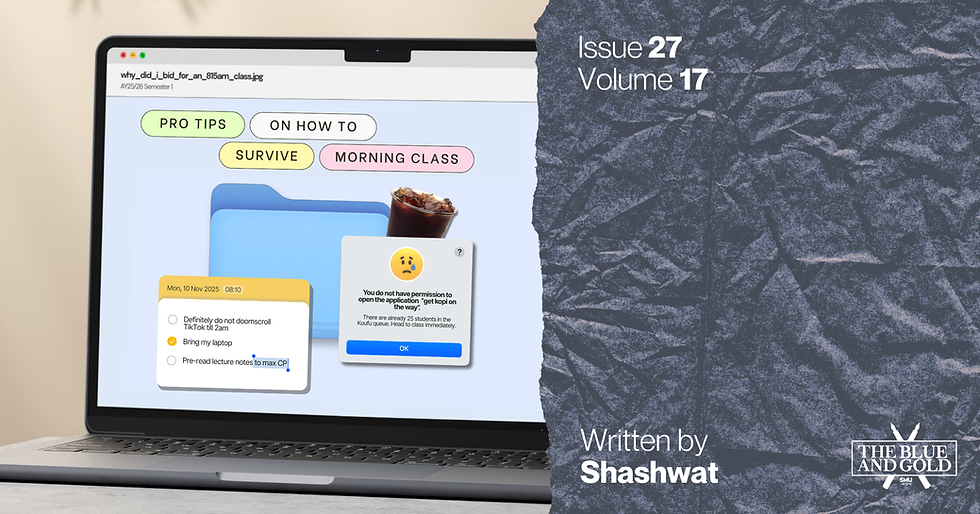Beyond Grades: Why You Should Take The Mod That Satisfies Your Curiosity
- Shashwat
- Nov 9, 2025
- 4 min read
Have you ever taken that leap of faith and jumped into a course that's a complete 180 from your degree? Follow writer Shashwat as they dive into their experience of pursuing their thirst for learning outside of the regiment of our standard courses, and why taking that strange and random module may be your best decision yet!

For all the events SMU hosts and the variety of student clubs on campus, I’m convinced the most frenzied time of year is the last few weeks leading up to a new semester. Don’t believe me? Just check SMU Confess (or any forum, really) and watch the bidding drama unfold. But while students rush to decry a mod as ‘fluff’ or a ‘GPA-killer’, it’s important to ask - what really drives us to pick the courses that we do? Amidst all of this, have we lost the spark of academic curiosity?
To be fair, SMU does offer a second major across schools, but few choose to experiment beyond the conventional tracks. Some students do choose to pursue CIS, but the vast majority must still grapple with course requirements and timelines before looking elsewhere.
On one hand, it’s easy to see why. Between course requirements, the need to keep grades up and to painstakingly design schedules to bid with friends for group projects, bidding is difficult at the best of times. Add in limited slots, and certain courses with rapidly ballooning prices (here’s looking at you, Finance 101), and it becomes a downright challenge.
On the other hand, university is a unique opportunity to not merely advance one’s education and qualifications but also to explore your own academic interests with the resources available. With 8 schools having so many different classes, professors and 2 well-stocked libraries, SMU represents a treasure trove of knowledge to seek.
One response may be that with everything online, it is easier now than ever to learn about something new by ourselves. I beg to differ. With the rise of ‘brainrot’ and declining attention spans, as well as the prevalence of rampant misinformation online, it raises serious questions over what we truly can gain on our own. Moreover, I believe it takes a certain academic rigour to engage with a topic, challenging your own perceptions before truly understanding it.
Amidst all of this, while bidding, I decided to go forth and experiment. For one semester, I would take up one class that seemed somewhat interesting from an entirely different school, and gamble my grades in pursuit of a new experience. Still, I remember more than a few eyebrows raised when I told my friends I was taking up an SOSS class on governance. “But why?”, “Isn’t it outside your major? ”Won’t it hurt your GPA?” was just a few of the questions they asked.
Those doubts only grew stronger during the first lecture, when I realised I was the only business student in class. Hearing the other seniors split off and chat while discussing their social work internships or casually discussing world affairs in class was agony. They seemed comfortable on their home turf, and I was on the outside looking in.
However, a key facet of each lecture was the dialogue. We were encouraged to debate and disagree respectfully, which sparked plenty of conversation, from ardent case discussions to boldly challenging theory. It also gave me a chance to engage in critical discussion (not just class part!) and even act as devil’s advocate. It was a formative experience, engaging with the material and being confident enough to articulate my views at length. Moreover, handling academic jargon, wrapping my head around social frameworks, and working on lengthy policy briefs were part of a wholly different academic experience I had to scramble to adjust to. And yet, I looked forward to learning something new every week.
Looking back, I can confidently say that taking the class was definitely worth the knowledge I had gained. Beyond just the content, it afforded me a unique perspective of how bureaucrats, society and organisations interact with each other to shape the world around us, as well as how we can approach and take down thorny public issues. Aside from speaking up, it also helped me connect with SOSS seniors pursuing vastly different courses, which I otherwise might not have. All of this from just a class I thought looked fun!
“Study without desire spoils the memory, and it retains nothing that it takes in,” said Leonardo da Vinci, and I agree. In fact, doing a course you are actually interested in helps motivated to learn, even during exam preparation. If anything, no knowledge is ever wasted, since the process of learning itself helps the brain forge new neural pathways, eventually making the mind sharper. An unfamiliar course poses its own intellectual challenges, and tackling them helped me that much further along the learning curve.
Ultimately, I would say it depends on your own preference. If you are the type of student focused on only a few courses and maintaining a high GPA, that is understandable. But the next time a new class listing catches your eye, don’t be afraid to try, despite what others might say or how irrelevant it might seem. You might just learn something new in the process.







Comments